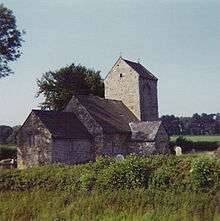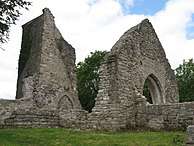St Mary the Virgin Church, Caerau, Cardiff
St. Mary the Virgin Church is a deconsecrated and ruined church in the parish of Caerau with Ely, Cardiff, Wales. It was built in the 13th century on a Roman encampment[1] and closed for the last time in 1973.


History
The ruins of St. Mary’s Church stand on the site of Caerau Hillfort on a natural plateau at the Caerau end of a hill range extending from Leckwith to Caerau.[2] The church is first mentioned in the Taxatio Ecclesiasticus of Pope Nicholas IV in 1291 and was probably built in 1260.[3] Since then it has undergone many repairs and alterations. It was substantially rebuilt by the Reverend Victor Jones in 1960-61. In 1973 it was closed and deconsecrated and has subsequently deteriorated into a ruin due to continuous vandalism.[4][5] Since 1999 a group of former and current parishioners, the Friends of St. Mary’s Church at Caerau, have been campaigning to preserve and commemorate the remains of the church.
Archaeologia Cambrensis in 1901 describes its 1848 state as follows:
Archaeologia Cambrensis, 1901, Vol. 1, 6th Series pp 247-248.
The building became Grade II listed in 1980.[6]
References
- Archaeologia Cambrensis Vol. 1. Cambrian Archaeological Association. 1901. pp. 247–248.
- Christopher Holder (1975). Wales: An Archaeological Guide. ISBN 0-571-08221-1
- R.M. Wools and J Guy (1960). Parish Church of Saint Mary the Virgin, Caerau
- Delia Jay and Rosemary Lewis (2008). St Mary The Virgin Church, and hill fort at Caerau. ISBN 978-0-9560137-0-5
- https://archive.today/20170501140641/http://www.stmaryscaerau.org/review_cardiff_post_2009.jpg
- Church of St Mary, Caerau, British Listed Buildings. Retrieved 31 August 2013.